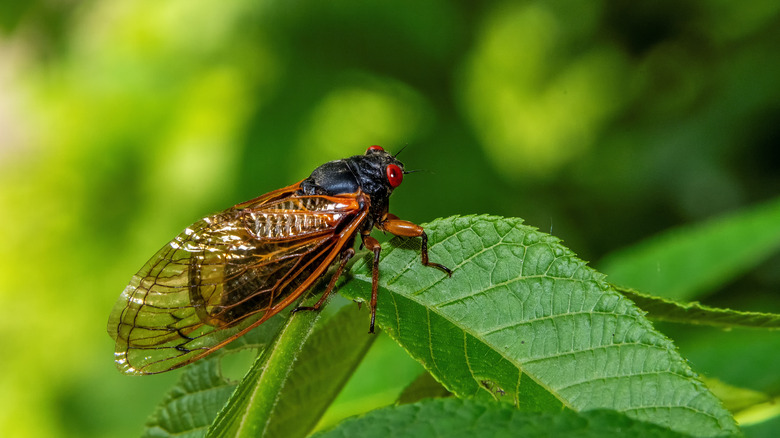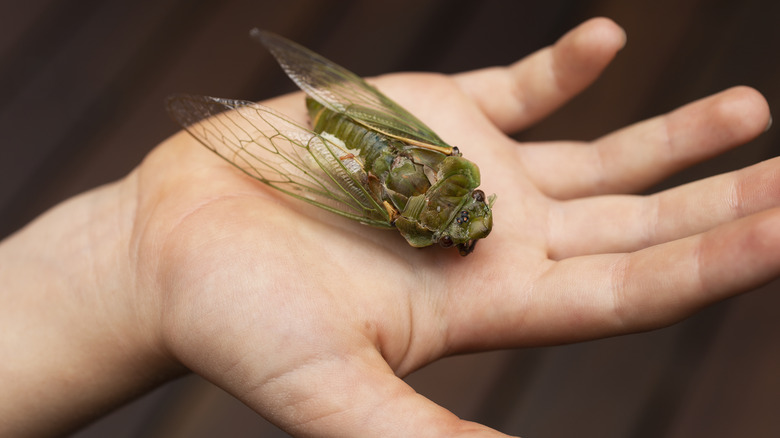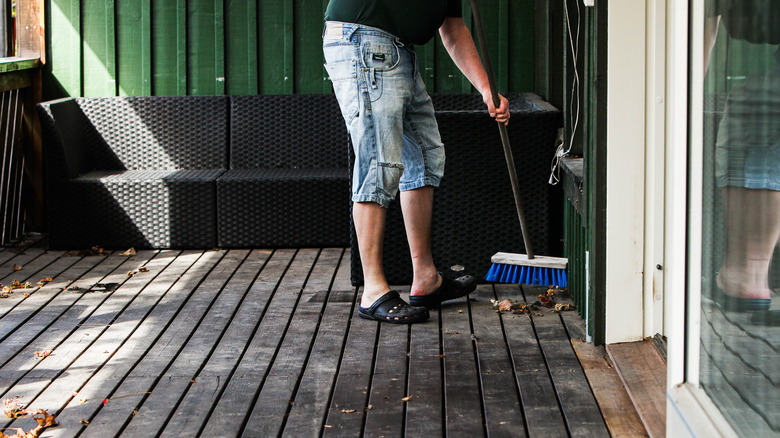The Awful Odor Of The Cicada Invasion Is Actually The Beginning Of The End
Every summer there are small broods of cicadas that sing from the treetops, but you've probably heard folks mention that 2024 will be the year of the cicada due to two massive broods emerging at the same place and time. Cicadas begin digging out from the ground once soil temperatures reach 64 degrees Fahrenheit, usually in late May or June, and will continue to sing until mid to late summer, depending on geographic location. As the cicada "invasion" comes to a close, you may start to notice another rather unpleasant presence in your yard: a strong odor like roadkill or heavy ammonia. If you live in an area where the two massive broods emerged this year, this powerful smell could be even more noticeable than usual.
While it might seem overwhelming in your backyard, this odor is nothing to be concerned about; it's simply a sign that mature cicadas are dying off and nature is taking its course in decomposing their bodies. For those who aren't fans of the loud bugs, this could be a welcome sign that cicada season is finally coming to a close, but even if you're sad to see them go, there is still a silver lining. If you can stand to wait out the stink, your garden may reap some surprising benefits that help it spring all kinds of new life.
Decomposing cicada bodies emit a foul odor
If you live in an area with dense cicada populations, the foul odor permeating through your yard in late summer is likely the result of decomposition. Depending on the brood, cicadas live for several years underground, but after they emerge, they only live for around three to six weeks. During this time, they'll climb the trees, shed their exoskeletons, sing to attract a mate, and lay eggs. After this, the adults have essentially fulfilled their purpose, and so those that aren't eaten by predators will begin to die off naturally. As usually happens when animals die, microbes begin to move in and decompose the bodies, and hundreds or thousands of decomposing buggy bodies can create an impressive stench.
As bacteria and fungi break down the bugs, they can release some uniquely smelly compounds. Allen Lawrance, curator of entomology at the Peggy Notebaert Nature Museum explained to Block Club Chicago, "Ammonia has a strong odor, as do some VOCs containing nitrogen and phosphorus — which the bodies of periodical cicadas are rich in." It's not all doom and gloom either; as nature takes its course, the death of these cool insects brings way to new life! Decomposing cicadas will release nitrogen, potassium, and other compounds into the soil, acting like an organic fertilizer that'll do wonders for your garden.
A little summer cleaning can speed up the process
While it might be unpleasant, it shouldn't take more than a couple weeks for the nauseating smell to fade away. The rotten aroma is a healthy sign of nature at work, but there are some steps you can take to reduce its presence in your backyard. A little cleaning is a good place to start. You can't destroy all the bugs in your neighborhood, but sweeping off your porch and walkways may help to shuffle them away from your patio — and your nostrils. Don't forget the gutters either; neglecting to clean your gutters could do more harm than you think. In late summer, they could be clogged with cicada bodies or exoskeletons left over from molting, leading to pooled water and even more odors.
If cicadas are littering your lawn, you can try aerating the soil to assist in decomposition, reduce the smell, and nourish your yard even more with the insects' natural compounds. "Anaerobic decomposition may occur if there are pockets that lack oxygen, which produces more foul odors than aerobic decomposition," explained curator of entomology Allen Lawrance (via Block Club Chicago). Attracting natural predators like possums, raccoons, and birds may also help cicadas and their corpses disappear from your yard more quickly.


